 MyDogBreeds
MyDogBreeds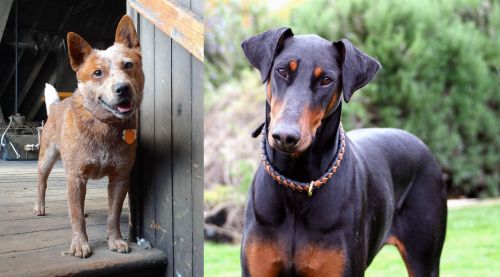 Red Heeler is originated from Australia but Doberman Pinscher is originated from Germany. Red Heeler may grow 21 cm / 8 inches shorter than Doberman Pinscher. Red Heeler may weigh 29 kg / 63 pounds lesser than Doberman Pinscher. Red Heeler may live 4 years more than Doberman Pinscher. Both Red Heeler and Doberman Pinscher has almost same litter size. Both Red Heeler and Doberman Pinscher requires Low maintenance.
Red Heeler is originated from Australia but Doberman Pinscher is originated from Germany. Red Heeler may grow 21 cm / 8 inches shorter than Doberman Pinscher. Red Heeler may weigh 29 kg / 63 pounds lesser than Doberman Pinscher. Red Heeler may live 4 years more than Doberman Pinscher. Both Red Heeler and Doberman Pinscher has almost same litter size. Both Red Heeler and Doberman Pinscher requires Low maintenance.
 Known also as the Australian Cattle Dog, the Red Heeler is also known as the Blue Heeler. This is a breed of herding dog originally developed in Australia.
Known also as the Australian Cattle Dog, the Red Heeler is also known as the Blue Heeler. This is a breed of herding dog originally developed in Australia.
These dogs are known for their stamina and resilience with driving cattle over long distances in hot weather and across rough terrain.
It was George Eliott who developed the Red Heeler – crossing native Dingoes with Collies and other herding dogs.
In America, the breed was fully recognised in September 1980.
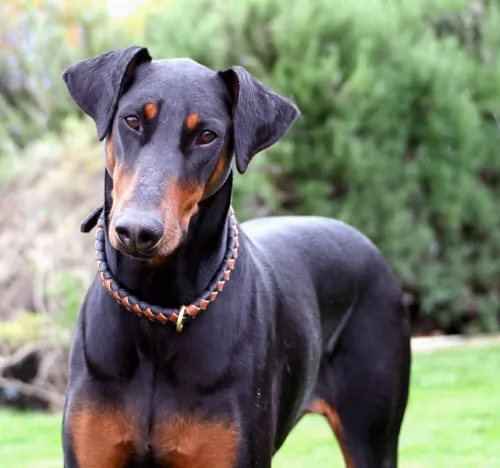 The origin of Doberman is Apolda, in Germany in 1890. It was officially recognized as a breed in 1900. The name originally called as Thuringer pinscher or Plizeilichi and the peer was renamed as DOBERMAN PINSCHER in 1899.American Kennel Club recognized DOBERMAN PINSCHER in 1908. The German tax collector called Karl friedrich developed Doberman.
The origin of Doberman is Apolda, in Germany in 1890. It was officially recognized as a breed in 1900. The name originally called as Thuringer pinscher or Plizeilichi and the peer was renamed as DOBERMAN PINSCHER in 1899.American Kennel Club recognized DOBERMAN PINSCHER in 1908. The German tax collector called Karl friedrich developed Doberman.
He developed a breed that would be able to protect him from his surroundings and from his neighborhoods. This Dober also ran as a local animal shelter and approch many dogs for his breeding program. But karl did not kept any proper records or document for this breeds origin. Dobeis are also found through United States, Russia and South Africa.
 The Red Heeler is a medium-sized dog standing at between 43 to 51 cm in height and weighing in the region of 14 – 16 kg.
The Red Heeler is a medium-sized dog standing at between 43 to 51 cm in height and weighing in the region of 14 – 16 kg.
He is muscular, with a sturdy build. The coat of this robust dog is shortish and thick and quite often you’ll find a white star marking on he forehead. The coat is a blue-grey color or reddish. The tail of this dog is long and the ears are erect.
The Red Heeler has always been a working dog so he is energetic and lively, being independent and strong-willed.
He is super intelligent too and can be easily trained and socialized. He is a dog that simply loves the outdoors and if you don’t live on a farm, he is going to need lots of exercise.
He gets on well with kids and other pets, but children should be taught to respect him and be kind towards him, otherwise he might not tolerate them. He is a loyal, protective dog, wanting to ensure the safety of his human family.
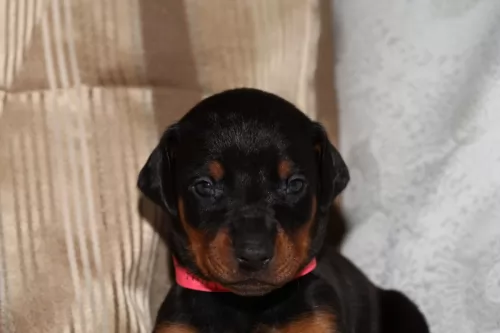 Dobermans are certainly shorthaired mixed –breed shepherd dogs, this kind of dogs are chosen only for their intelligent, sound and endure. This breed is best in attitude and appearance, and now it is found in world wide. Dobermans are highly intelligent and fast runners. So mostly dobers are only suited for Police, Army and Guard works. Dobies are also used as guide dogs for the blind.
Dobermans are certainly shorthaired mixed –breed shepherd dogs, this kind of dogs are chosen only for their intelligent, sound and endure. This breed is best in attitude and appearance, and now it is found in world wide. Dobermans are highly intelligent and fast runners. So mostly dobers are only suited for Police, Army and Guard works. Dobies are also used as guide dogs for the blind.
They are very elegant in appearance. Dobies are watchful, determined, energetic, fearless, obedient, alert and loyal. Dobies are short coat so it is easy for care. Brushing regularly can avoid shedding at home. They have almond shaped eyes, they have long narrow heads. The Doberman ears are often cropped but many of the owners like dobers by their nature. Dobers looking was always like a graceful giant.
 When you bring a Red Heeler into your home, you must know that you’re never going to have a dull moment. They’re not content to lie around with nothing to do. These popular dogs literally coax you to come out and to be active.
When you bring a Red Heeler into your home, you must know that you’re never going to have a dull moment. They’re not content to lie around with nothing to do. These popular dogs literally coax you to come out and to be active.
Red Heelers need lots of activities and lots of room, so they aren’t particularly suited to life in the city. Large properties and plenty to do is what they ask for.
Your Red Heeler is going to make a splendid pet, loyal and devoted, the perfect example of man’s best friend.
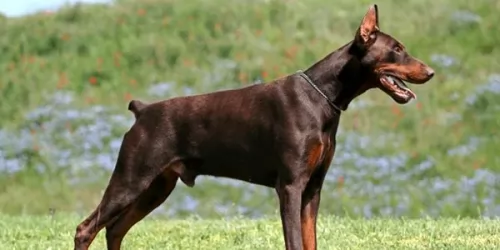 Dobermans are individual in personalities. Some dogs are friendly and outgoing; some Dobies are reserved and shy. Some will be more dominant with other dogs it used to chase small dogs and cats. Most of the dobers are soft in character and love companionship with people.
Dobermans are individual in personalities. Some dogs are friendly and outgoing; some Dobies are reserved and shy. Some will be more dominant with other dogs it used to chase small dogs and cats. Most of the dobers are soft in character and love companionship with people.
Dobers have high energy level and it requires a lot of exercise in order to avoid harmful behavior to others. We should keep them interested because intelligent dogs are easily got bored. They mostly enjoys only in outing because they will be happy with the people who walks, runs and in bike riding.
When learning new things they are the best. Dobermans are not able to be a lazy. For many years dobers are the only dogs being excellent as police dogs. Because they are highly active in nature so they are interested in new this for learning.
Dobers are apartment adaptable dogs. They used to bark but are close and friendly to people. At the same time we have to train dobers to welcome the guest also.
 Your Red Heeler can live to be 15 years of age with good care. Every dog however, can fall prey to some of the many common dog diseases there are, some of which can be -
Your Red Heeler can live to be 15 years of age with good care. Every dog however, can fall prey to some of the many common dog diseases there are, some of which can be -
There are quite a lot of congenital and inherited musculoskeletal disorders in dogs, with some of the more common ones being hip dysplasia and muscular dystrophy for instance.
There are some of these musculosceletal problems which can be fatal. Some of the typical symptoms you’ll see with these problems are difficulty climbing stairs or jumping, loss of muscle mass in the hind limbs, arthritis and lameness.
The retina of the eye is that light-sensitive part and which is part of the central nervous system. With retinal degeneration, the cells decline, leading to impaired vision and sometimes even blindness.
Some symptoms to look out for include dilated pupils, night blindness and the inability to see clearly in bright light. The disease worsens over times with sudden blindness being quite common with older dogs. Your vet will want a thorough history of your dog’s health.
Other dog diseases to be very aware of are cancer, obesity, bloat, hip dysplasia and epilepsy.
 The Red Heeler is an active dog, and apart from walks which will give him the chance to sniff around, he will need lots of other forms of exercise. Rope pulling games he’ll love and running after a ball will please him because it takes him back to days when he used to run around and herd livestock.
The Red Heeler is an active dog, and apart from walks which will give him the chance to sniff around, he will need lots of other forms of exercise. Rope pulling games he’ll love and running after a ball will please him because it takes him back to days when he used to run around and herd livestock.
If you’re an outdoorsy type of person who loves hiking in the wilds and swimming in rivers, you can count this dog in.
You can look at the Red Heeler as a low maintenance dog. He does shed, but a good brush of the coat twice a week will be excellent for him. If he doesn’t wear his nails down naturally, you will need to trim them. Also, while you are brushing him, check his ears and eyes and inside his mouth to make sure he is clear of all infections.
Red Heelers rely on good food for their resilience and stamina, and for convenience it is good to have commercially manufactured dog food as a backup. The best is home-made food which is easy to prepare and totally uncomplicated.
Simply add into one big pot chicken, brown rice or pasta and spinach, sweet potatoes and carrots. This food can all be chopped up, refrigerated and added warmed up and in small portions to your pet's dry kibble once or twice a week. Simple and tasty, your Red Heeler will love it and thrive on it too.
Ensure there is always a bowl of fresh, cool water within his reach.
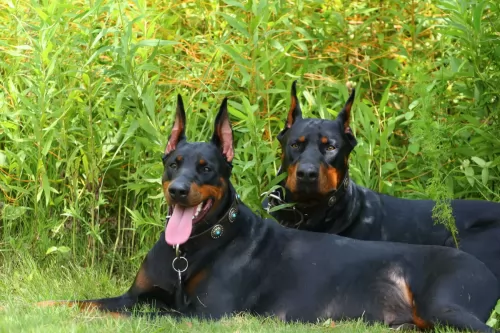 Dobers are mostly come in black, blue, red or fawn. Dobers are low maintenance for grooming. They were clean dogs because they never make a strong dog odor. Using brush in dobers hair for once per week reduces hair fall control. Dobers are not requiring frequent bathing most of the owners are getting bath for 3 or 4 times per year in grooming.
Dobers are mostly come in black, blue, red or fawn. Dobers are low maintenance for grooming. They were clean dogs because they never make a strong dog odor. Using brush in dobers hair for once per week reduces hair fall control. Dobers are not requiring frequent bathing most of the owners are getting bath for 3 or 4 times per year in grooming.
You can feed your puppy 2-3 small meals per day until it was 4 months old. And then have to decrease one meal and two for a day. And often you should not keep food and leave food sitting out all the time. Then after six months needs to stop feeding much vitamins and minerals because it leads a several health problems in his muscle and joints.
This type of dogs should not be tied up alone outside, because it should be manifest itself by barking chewing. The people who are working for a long time should not be adopting this type of dogs. Naturally dobers are well protective to our home and people. At the same time small children must be supervised. At the same time if we are not strict, dobers would be get out of our hand.